|
|
|
|
| Adam Carr's Election Archive
|
Australian federal election, 2022
Division of Cook, New South Wales
Named for: Captain James Cook (1728-79), first European to see the
east coast of Australia (1770)
Southern Sydney: Caringbah, Cronulla, Miranda, Ramsgate, Sylvania
State seats: All of
Cronulla, parts of
Kogarah,
Miranda,
Oatley and
Rockdale
Local government areas: Parts of
Bayside,
Georges River and
Sutherland
Borders with:
Banks,
Barton and
Hughes
Enrolment at 2019 election: 107,052
Enrolment at 2022 election: 110,313 (+03.1)
1999 republic referendum: No 52.9
2018 same-sex marriage survey: Yes 55.0
Sitting member: Hon Scott Morrison (Liberal):
Elected 2007, 2010, 2013, 2016, 2019
2007 Liberal majority over Labor: 6.6%
2010 Liberal majority over Labor: 12.7%
2013 Liberal majority over Labor: 16.4%
2016 Liberal majority over Labor: 15.4%
2019 Liberal majority over Labor: 19.0%
Liberal two-party vote 1983-2019
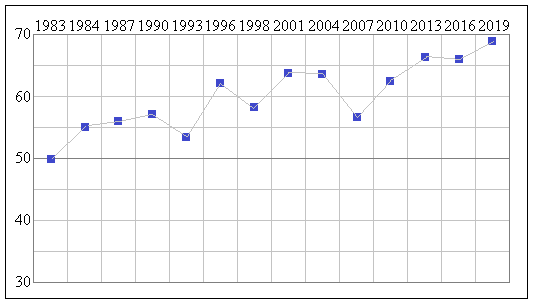
Status: Very safe Liberal
Best Liberal booths, two-party vote: Taren Point (80.1), Sylvania (76.2), Lilli Pilli (77.5),
Burraneer (77.1), Burraneer Bay (75.9)
Best Labor booths, two-party vote: Miranda South (45.2), Carlton South (44.7), Brighton-le-Sands (43.7),
Miranda Central (41.9), Kogarah East (41.6)
2019 results
Statistics and history
Candidates in ballot-paper order:
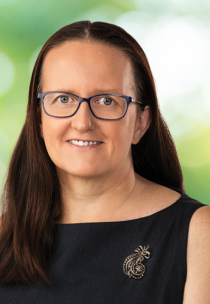 |
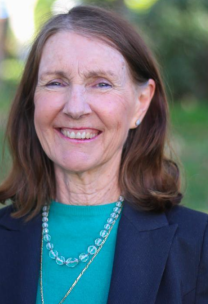 |
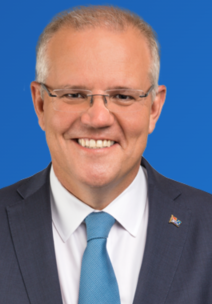 |
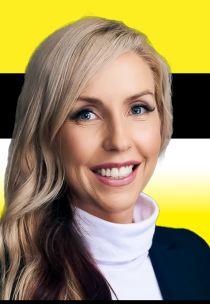 |
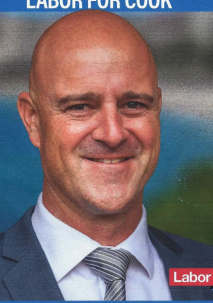 |
1. Gaye Cameron
Pauline Hanson's One Nation |
2. Catherine Dyson
Australian Greens |
3. Hon Scott Morrison
Liberal Party |
4. Jacqueline Guinane
United Australia Party |
5. Simon Earle
Australian Labor Party |
Candidate websites:
Gaye Cameron
Catherine Dyson
Simon Earle
Jacqueline Guinane
Hon Scott Morrison
Division of Cook
Cook was created in 1969, based in the southern suburbs of Sydney between Botany Bay and the Georges River (there
was an earlier seat of Cook in inner Sydney, which was abolished in 1955). Centred on Cronulla and Miranda, it is a
solidly middle-class area with a high proportion of people in professional occupations. In the 1970s these were
fairly new suburbs with a high level of families with children and people paying mortgages. Today the population is
mainly older home-owners, with a low proportion of people born in non English speaking countries. Cook was politically
marginal when it was created, and Labor won it in 1972 and 1974, but it grew steadily safer for the Liberals in the
1980s and '90s.
The 2016 redistribution extended Cook north of the Georges River for the first time, taking in Blakehurst,
Ramsgate and Sans Souci. This somewhat reduced the Liberal majority, but not enough to pose any threat to the Liberal Party's
hold on the seat.
Bruce Baird, a former NSW Liberal state minister, won Cook in 1998. Baird expected to be a minister when he came to
Canberra, but was disappointed, and joined
Petro Georgiou in becoming a back-bench rebel, especially on immigration
issues. He retired in 2007.
Scott Morrison, Liberal MP for Cook since 2007, was born into a middle-class family in Sydney's eastern suburbs: his
father was a police officer and Mayor of Waverley. He was educated at state schools and the University of NSW, where he
gained a degree in geography. He worked as policy and research manager for the Property Council of Australia,
deputy chief executive of the Australian Tourism Task Force, general manager of the Tourism Council, director of the
New Zealand Office of Tourism and Sport, state director of the NSW Liberal Party and finally managing director of
Tourism Australia - a position from which he was sacked by Liberal Tourism Minister
Fran Bailey.
At the 2007 election, Morrison sought Liberal endorsement for Cook, but was defeated by Michael Towke. Soon after,
Towke was disendorsed following various allegations against him, and Morrison was installed as Liberal candidate by the NSW
Liberal State Executive. (The allegations against Towke were later disproved.)
Despite this controversy, Morrison, with his impressive CV, was expected to gain rapid promotion. He was on the
opposition front bench from 2008, and became Immigration Minister in the Abbott Government in 2013. In this position he was
in charge of "Operation Sovereign Borders", which effectively stopped the influx of unauthorised boat arrivals from Indonesia
which had plagued the Labor government. This made him one of the successes of the otherwise chaotic Abbott government. He was
initially a strong supporter of
Tony Abbott, but abandoned him in 2015, and when
Malcolm Turnbull deposed Abbott in September 2015
he became Treasurer in the Turnbull Government. He was also a success in this position.
In August 2018, when crisis engulfed the Turnbull government, Morrison at first strongly endorsed Turnbull against the
challenge from the right's candidate,
Peter Dutton. But when it became clear that Turnbull could not survive, he
declared his own candidacy, and easily defeated Dutton to become Liberal leader and Prime Minister. Although the
party's moderates supported Morrison against Dutton, he is a strong social conservative.
Labor under
Bill Shorten having come close to winning in 2016, Morrison was widely expected to lose the 2019 election, and the
opinion polls generally supported this view. But Morrison pulled off a surprise victory, mainly by exploiting fears that
Labor's ambitious climate policies would cost jobs in the resources sector, and also opposition to Labor's taxation policies.
Morrison won a strong swing to the government parties in Queensland and most of NSW, while losing support in upper-income
urban areas.
Since 2019 Morrison has suffered reputational damage as a result of his government's less than brilliant
response to the 2020-21 bushfires, the 2021-22 floods and the COVID pandemic, as well as through the prolonged factional conflict
in the NSW Liberal Party. He enters the 2022 election campaign well behind in the opinion polls.
The Labor candidate is Simon Earle, CEO of a training company. The Greens candidate is Catherine Dyson, a registered nurse and midwife.
Demographics:
Median weekly household income: $1,805 (Australia $1,438)
People over 65: 18.8% (Australia 15.8%)
Australian born: 72.5% (Australia 66.7%)
Ancestry: Greek 5.9%
Non-English-speaking households: 24.4% (Australia 22.2%)
Catholics 28.4% (Australia 22.6%)
No religion 21.7% (Australia 29.6%)
University graduates: 23.3% (Australia 22.0%)
Professional and managerial employment: 39.5% (Australia 35.2%)
Employed in manufacturing and construction: 24.1% (Australia 22.9%)
Paying a mortgage: 33.1% (Australia 34.5%)
Renting: 25.7% (Australia 30.9%)
Traditional families: 35.9% (Australia 32.8%)
Back to main page
| |












